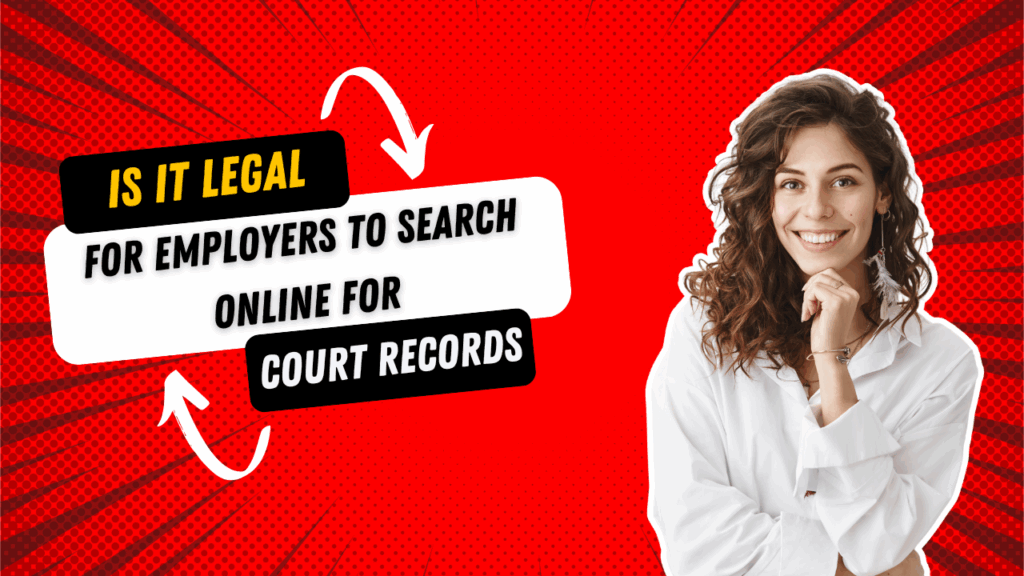If you’re applying for a job and worried your court record might pop up, you’re not alone. Many people ask the same question: Can employers legally search court records online?
The short answer is yes. But there’s a catch. Employers have rules they have to follow. And you have rights too.
Dig Deeper: How to Remove Court Records from Google Search
What the Law Says
Public Records Are Public
Court records in most states are public. Anyone with internet access can search them. This includes employers.
They can type your name into a county court website and see your case. Arrests, lawsuits, evictions, bankruptcies. It’s all out there.
That doesn’t mean they can use the info however they want.
The Fair Credit Reporting Act (FCRA)
If an employer uses a background check company, the FCRA kicks in.
This federal law says:
- You must give written permission for a background check.
- The employer must give you a copy if something in the report hurts your chances.
- You get a chance to dispute it.
If they skip these steps, they’re breaking the law.
The Rise of Online Court Searches
It’s Easy Now
Years ago, you had to drive to a courthouse to pull a file. Now you can find court records with a few clicks.
According to Pew Research, over 90% of U.S. counties have at least some court data online.
Employers know this. So do background screening companies.
Some companies even sell subscriptions for bulk court record access.
The Problem: Old or Wrong Info
Court websites don’t always update fast. A dismissed charge might still show up.
And third-party sites? They’re even worse. They grab old data and don’t refresh it often.
One guy shared his story with us. “I had my charges dropped, but two years later the arrest still showed on one of those background sites. I almost lost a new job because of it.”
State Laws Add More Rules
Ban-the-Box Laws
Many states have passed laws that ban employers from asking about criminal records on job applications.
This doesn’t stop them from running background checks. But it delays when they can ask.
Some states require them to wait until after the first interview or a conditional offer.
States with Ban-the-Box (as of 2024)
- California
- New York
- Illinois
- Massachusetts
- Washington
- New Jersey
- More than 35 total
Always check your state’s rules. They change often.
Expunged or Sealed Records
In most states, it’s illegal to use an expunged or sealed record when making hiring decisions.
Employers may not even see the record depending on how they run the search.
If your record was cleared, and they still used it against you, you could have a legal case.
What Employers Can and Can’t Do
What They Can Do
- Look up public records online
- Hire a third-party screening firm
- Ask about records (in many states)
What They Can’t Do
- Discriminate based on race, age, or gender
- Lie or hide the fact they’re doing a background check
- Use sealed or expunged records against you (in most states)
What You Can Do to Protect Yourself
1. Run a Background Check on Yourself
See what employers see. You can use paid services or check your local court’s website for free.
Look for:
- Old criminal records
- Evictions
- Civil judgments
- Mugshots
2. Clean Up Third-Party Sites
If you find court records on sites like BeenVerified, MyLife, or TruthFinder, send a removal request.
These sites are required under the Fair Credit Reporting Act to keep their info accurate.
They also have to remove it if you can prove it was expunged, sealed, or incorrect.
3. Push Down the Bad Stuff
Build positive content that ranks high in search results. Create a LinkedIn profile. Start a blog. Get featured in community or industry websites.
Reputation management tools like Top Shelf Reputation help track what’s out there and boost the good stuff.
4. Know Your Rights
If a company pulls your record without your OK, report them.
You can file a complaint with the FTC or your state’s attorney general.
If you were denied a job unfairly, you may be able to sue under FCRA or discrimination laws.
Real Talk: Employers Will Keep Looking
It’s not going away. As long as court records are online, employers will check them.
Some do it before they even meet you. Others wait until right before hiring.
In a recent survey by HR.com, over 80% of companies said they run background checks on all new hires.
The best move is to get ahead of it.
Final Thoughts
Yes, it’s legal for employers to search court records online. But they have rules. And you have tools.
Check your record. Clean up what you can. Push down what you can’t erase.
You don’t need to hide your past. Just make sure it doesn’t speak louder than your present.
If you need help managing your search results, a reputation management service like Top Shelf Reputation can guide you step by step.

